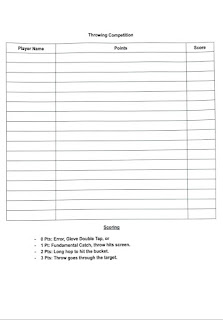Using Competitions to Build Transparent Conversations
"Competition on anything is good, because it makes everybody better."- Eddy Cue
Athletes love to compete, and it rises everyone up to a certain level of performance. Competition also allows athletes and coaches to relfect on the performance of each athlete to create an open and honest conversation. In this post I will go over the importance of having competitions in your practice/training environments and the importance of self-reflection to that competition.
In the University of Charleston (West Virginia) baseball program we track the performance of our baseball players regularly. This allows our student-athletes to improve their competitiveness while also working through game-like environments at game speed or above. These environments allow our student-athletes to make the game slow down once they are playing an opponent in a different uniform.
Additionally, these competitions allow for our student-athletes to self reflect, which is a skill that is necessary for success in any profession or endeavor. When reflecting it is important to create an open and honest line of communicaiton between coach to player, player to player, and coach to coach. This feedback may hurt feelings at times, but within that feedback the adjustments made will improve overall performance.
When organizing a competition there are a few steps that need to be kept in mind. First you want to understand what you want to track. The competition needs to be valid with what you are trying to get out of it. If you have a compeition based on throwing accuracy, then your scoring system needs to reflect that. This is important because the student-athletes will understand what happened correctly or incorrectly during the competition because of the points possible on the scoring system. Then have the players reflect upon their performance. You could have them either send you a message or have a one on one discussion on their performance to raise awareness on what needs improved. You can also have them silently reflect and as the coach go and ask them their thoughts one on one about their performance. Either way, you are allowing the student-athlete to think about their performance and put in some actions steps on how to remedy what didn't go well.
As a coach if your team is performing poorly on a specific skill during competition, then you will need to reflect on what changes need to be made in order to improve the performance of your players. There are several avenues you can go down to in order to improve performance of a specific skill. The first avenue is to ask your fellow coaches on the coaching staff. They know the players well because they see them every day, and their perspective can provide you with tips on how to help that player improve. Another option is to ask the players directly on how to improve their performance. Their expertise is valid because they know themselves best and can provide you with advice on how to get the most out of them. The last option is to reach out to coaches who you respect that have been in your situation before. Their experience can help you solve the problem you are facing.
. 
(An example of an outfield competition)
Lastly when creating a competition for your team, be creative. Your competition can be as high tech or low tech as you want it to be. Either way, you are creating information for you and your players to reflect upon in order to improve performance. There are times when the throwing competition (see above image) has a camera and pitching machine used. Then there are times when the camera and machine are not, but either way these competitions allow the student-athletes to reflect on their performance.

Comments
Post a Comment